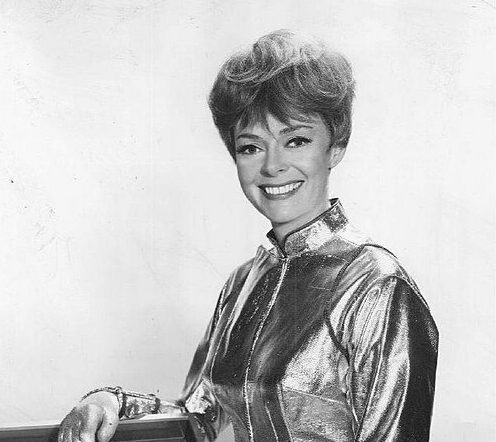Springtime in Washington is famous for two things: the Japanese cherry blossoms and the annual White House Correspondents’ Association dinner. It’s one of D.C.’s biggest bashes of the year when the paparazzi and the glitterati come together for an evening of laughter.
There’s a woman who has one foot in each camp, making her uniquely qualified to attend the annual extravaganza. If you’re trying to spot her in photos of this year’s gala, don’t bother (for reasons you will soon understand). But hers is a remarkable story nonetheless.
Baby Boomers fondly remember actress June Lockhart from yesteryear. You will recall she played Timmy’s TV mom on “Lassie,” the astro mom on “Lost In Space,” and was the stand-in mom for the Bradley girls on “Petticoat Junction” after sitcom star Bea Bernadette became ill. For two decades, she was always welcomed into America’s homes as somebody’s mother.
But she also has a special distinction among the White House Press corps. Because the accomplished actress has a secret passion you probably don’t know about.
June Lockhart is a lifelong political news junkie.
It started as a little girl in the 1930s. Her parents (themselves actors) frequently entertained journalists in their home. That prompted little Lockhart to launch her own neighborhood kids’ newspaper. She got hooked on Time magazine in high school. Although the acting bug eventually bit, she never lost her fascination with news, the people who reported it, and politics.
After wrapping up her Tony Award-winning role in the 1948 Broadway rom-com For Love or Money, she finagled her way into the Oval Office for a chat with President Harry Truman. She asked what it was like to work there. “It’s just like being in jail,” Truman told her. When she requested his autograph, the celebrity-smitten chief executive gave her his fountain pen, too.
Her love of news landed her a spot as a regular on a 1950s primetime TV quiz show called “Who Said That?” Lockhart got to know fellow panelist Merriman Smith, the UPI correspondent who went on the win the Pulitzer Prize and the Presidential Medal of Freedom for his reporting from President Kennedy’s Dallas motorcade in 1963.
That friendship proved invaluable. Smith helped her fulfill a lifelong dream by assisting Lockhart in getting credentials to accompany the press contingent covering the 1956 presidential campaign. Questioned by “the boys on the bus” who was going to win, she said Dwight Eisenhower would. They scoffed. And Ike coasted to a comfortable reelection victory. The actress saw in the crowds what the journalists had missed.
The next summer, Lockhart and Hugh Downs were filling in as hosts of a TV talk show. The producer had longed hoped for an interview with presidential press secretary Jim Hagerty. Lockhart made a few calls and, on July 31, 1957, she sat down in the White House and talked to him on film. When it was over, Hagerty gave her something extraordinary: a lifetime White House press pass. Nearly 70 years later, she still has it.
There were other campaigns, other presidential meetings. She was on the press bus again when Nixon (“very stiff,” she says) lost one of the closest elections in history to John F. Kennedy in 1960, whom she went on to meet with her husband the following year (“charming and delightful”).
She made the most of that pass, too, whenever she was in Washington. While performing in “Steel Magnolias” at the Kennedy Center, she would often drop by the press room. In fact, she even got to ask Press Secretary Marlin Fitzwater a non-political question. She wondered who the vet was for President George H.W. Bush’s family dog, Millie. (That was hush-hush information, she was told.)
Lockhart attended the high-level press briefings through George W. Bush’s presidency. (“They were always so cordial.”)
Though she still keeps up with presidential comings and goings in the news, she no longer follows them in person. After all, June Lockhart will turn 100 years old on June 25.


